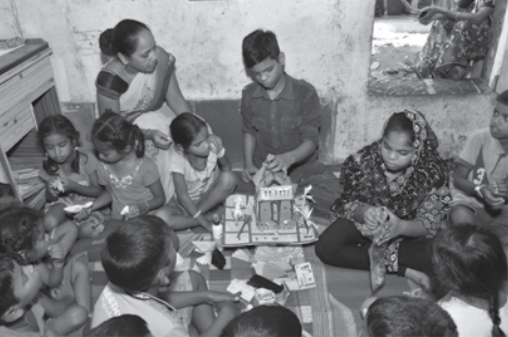
Sohail Sheikh, 15 years old and a student in the 9th Std, is one of the most active members of the
Bal Adhikar Sangrash Sangathan (BASS) (Child Rights Struggle Group) in Malvani, Mumbai. He
has a good voice and enlivens the centre with his singing. He takes part in many sports activities
and has a knack for crafting artistic creations. Seeing him in action, you might not realize that
Sohail Sheikh is blind but his disability has never prevented him from interacting with people
and diluted his enthusiasm for life.
Sohail lives in poor housing conditions and is being brought up by his grandmother. At home, as in
the Centre, Sohail is a great help to her in taking care of his siblings and looking after the house.
Sohail likes to spend as much time in the Centre as is possible. He believes that since his
association with the centre, his personality is developing because, as he says, “everyone here
understands me very well. They all love me…and I am able to look at myself differently” .
The Coronavirus Pandemic in 2020 was a global disaster for almost everyone, but the ones to
suffer most were the poor and marginalized communities and especially the children from these
communities. School systems closed down and when they did resume partially it was mostly
with online programmes which excluded the poorer sections who did not have access to smart
phones and other facilities. Many of these children were forced into child labour.
This is the story of how 300 school going children belonging to poor families engaged in
agricultural labour or working in the mines near Mirzapur, were able to beat the odds of
continuing their education. They did this with the help of a Misereor-aided project in Uttar
Pradesh through an alternative mode to online classes. The Youth Federation of the project
heard about classes being conducted through loudspeakers in Chhattisgarh and decided to
replicate this in their villages. They planned an educational programme for children from the
3rd-8th Standards using loudspeakers and with the youth as peer educators. They raised funds
for the equipment with the first ‘class’ run in the open, outside the CRRC Project centre and
eventually were running 2 batches in 10 villages. This helped to keep 300 children within the
school system and the enterprise was much appreciated by the families of the children, the
community as a whole and village and school authorities as well.